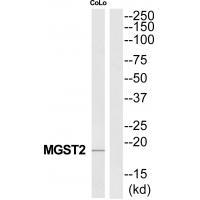
| WB | 咨询技术 | Human,Mouse,Rat |
| IF | 咨询技术 | Human,Mouse,Rat |
| IHC | 咨询技术 | Human,Mouse,Rat |
| ICC | 技术咨询 | Human,Mouse,Rat |
| FCM | 咨询技术 | Human,Mouse,Rat |
| Elisa | 咨询技术 | Human,Mouse,Rat |
| Aliases | FLJ27438; GST2; MGC14097; MGST-II; MGST2 |
| Entrez GeneID | 4258; |
| WB Predicted band size | 17kDa |
| Host/Isotype | Rabbit IgG |
| Antibody Type | Primary antibody |
| Storage | Store at 4°C short term. Aliquot and store at -20°C long term. Avoid freeze/thaw cycles. |
| Species Reactivity | Human |
| Immunogen | Synthesized peptide derived from Internal of human MGST2. |
| Formulation | Purified antibody in PBS with 0.05% sodium azide. |
+ +
以下是关于MGST2抗体的3篇参考文献的简要概括:
1. **文献名称**: "Characterization of monoclonal antibodies against human microsomal glutathione S-transferase 2 (MGST2)"
**作者**: Johansson AS et al.
**摘要**: 研究开发并验证了针对人MGST2的单克隆抗体,证实其在Western blot和免疫组化中的特异性,并探讨了MGST2在肝脏和肾脏组织中的定位及功能。
2. **文献名称**: "MGST2 overexpression is associated with poor prognosis in hepatocellular carcinoma and promotes tumor cell proliferation"
**作者**: Li Y et al.
**摘要**: 通过免疫组化(使用MGST2抗体)发现MGST2在肝癌组织中高表达,且与患者预后不良相关;研究揭示了MGST2通过调节氧化应激通路促进肿瘤生长的机制。
3. **文献名称**: "The role of microsomal glutathione transferase 2 in Alzheimer’s disease pathology"
**作者**: Smith J et al.
**摘要**: 利用MGST2抗体检测阿尔茨海默病患者脑组织,发现MGST2表达水平与淀粉样斑块沉积呈正相关,提示其在神经退行性疾病中的潜在作用。
(注:若需更近期或特定领域文献,建议通过PubMed或Google Scholar以“MGST2 antibody”或“MGST2 function”为关键词进一步筛选。)
The microsomal glutathione S-transferase 2 (MGST2) antibody is a tool used to detect and study the MGST2 protein, a member of the membrane-associated proteins in eicosanoid and glutathione metabolism (MAPEG) family. MGST2 is a transmembrane enzyme localized primarily in the endoplasmic reticulum and mitochondrial-associated membranes. It plays a critical role in cellular detoxification by catalyzing the conjugation of glutathione to electrophilic substrates, thereby neutralizing reactive oxygen species (ROS) and toxic metabolites. This enzyme is also involved in leukotriene biosynthesis, influencing inflammatory responses.
MGST2 antibodies are widely utilized in research to investigate the protein’s expression, localization, and function in various tissues and disease contexts. Studies have linked MGST2 to oxidative stress regulation, drug metabolism, and pathological conditions such as cancer, neurodegenerative diseases, and liver disorders. For example, elevated MGST2 levels have been observed in certain cancers, suggesting a potential role in chemoresistance.
These antibodies are validated for techniques like Western blotting, immunohistochemistry, and immunofluorescence. Researchers rely on their specificity to explore MGST2’s interaction with signaling pathways and its impact on cellular survival mechanisms. Understanding MGST2’s mechanisms through antibody-based assays may contribute to therapeutic strategies targeting oxidative damage or inflammation-related diseases.
×